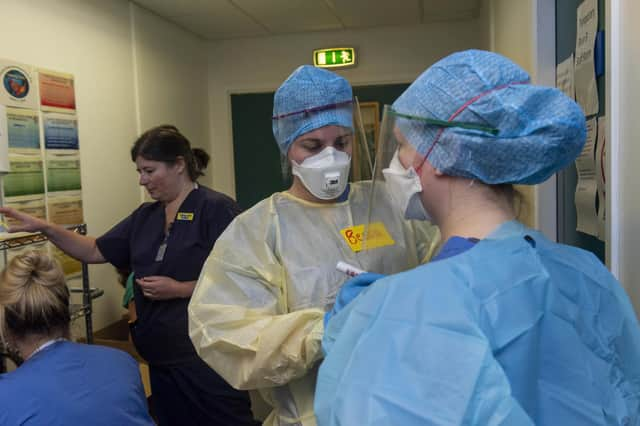Scotland 'at a very dangerous point' in battle with Covid-19 amid stark second lockdown warning


Scotland is at a “very dangerous place” said Nicola Sturgeon amid warnings of a potential second lockdown as cases continue to rise across the country.
The First Minister, speaking at her daily coronavirus briefing, said the rolling average of new positive cases had trebled in the last few weeks and cases were doubling every two or three weeks.
Advertisement
Hide AdAdvertisement
Hide AdShe added the data showed a “very definite increase” but assured the public it is not at the same rate it was in March and April when cases were doubling every two or three days.
Ms Sturgeon said: “We are of course trying to allow economic activity, as much of it as possible, to take place as safely as possible and we do that because of the other harms that happen if economic activity can take place.
"But if the virus runs out of control again, we will face restrictions that are in themselves deeply damaging to the economy.
"The best thing we can do right now not just for health but for the long-term good of the economy is suppress Covid as far as we possibly can.
Advertisement
Hide AdAdvertisement
Hide Ad"It is not an exaggeration to say Scotland is currently at a very dangerous point, so to is the UK as a whole many other countries across the world.
"We can see from the level of cases in countries like Spain and France that the current increase in cases could very easily continue and also start to translate into serious illness and deaths if we are not very careful.”
Ms Sturgeon said she would not say a second lockdown was likely but also refused to rule out the possibility of a return to the restrictions experienced at the beginning of the pandemic.
She said that would “not be credible” and reiterated the requirement for individuals and the government to do all they can to avoid “slipping into the mindset” that a second wave and second national lockdown is inevitable.
Advertisement
Hide AdAdvertisement
Hide AdShe added: “If we don’t want to lock ourselves down again, we all have to go through these really inconvenient but necessary things to try to keep it under control and I’m afraid it is as simple as that.”
The chief medical officer, Dr Gregor Smith, added that the growth in cases was not yet exponential but said it was crucial to “guard against” returning to numbers last seen in March and April.
He said: “We are now seeing a rise in cases and that should give us cause just for thought on what we can do now to slow down that rise and make sure we contain that in a way that it doesn’t become unconstrained.
"We are not seeing community spread and transmission to anywhere near the extent we saw, in fact we don’t have that community spread that was very evident in March and April.
Advertisement
Hide AdAdvertisement
Hide Ad"Anything we can do at this point of time, putting simple measures to make sure that we don’t allow ourselves to go back to that situation is what we have got to concentrate our efforts on.”
A message from the Editor:
Thank you for reading this story on our website. While I have your attention, I also have an important request to make of you.
The dramatic events of 2020 are having a major impact on many of our advertisers - and consequently the revenue we receive. We are now more reliant than ever on you taking out a digital subscription to support our journalism.
Subscribe to scotsman.com and enjoy unlimited access to Scottish news and information online and on our app. Visit https://www.scotsman.com/subscriptions now to sign up.
Subscribe to the Edinburgh Evening News online and enjoy unlimited access to trusted, fact-checked news and sport from Edinburgh and the Lothians. Visit https://www.edinburghnews.scotsman.com/subscriptions now to sign up.
By supporting us, we are able to support you in providing trusted, fact-checked content for this website.
Joy Yates
Editorial Director
Comment Guidelines
National World encourages reader discussion on our stories. User feedback, insights and back-and-forth exchanges add a rich layer of context to reporting. Please review our Community Guidelines before commenting.